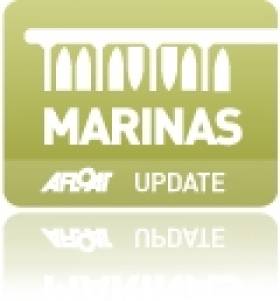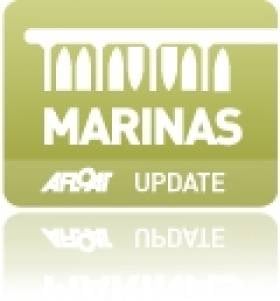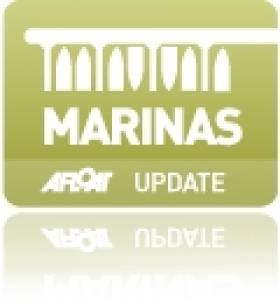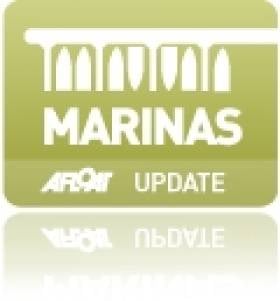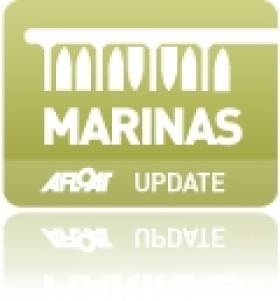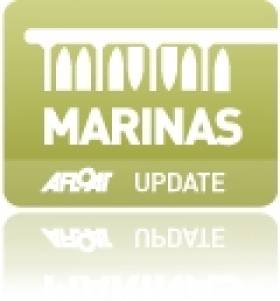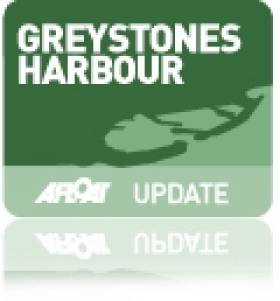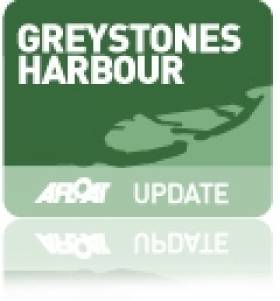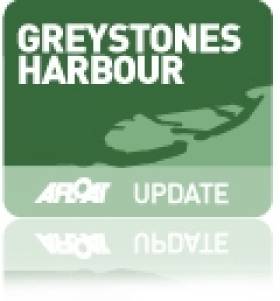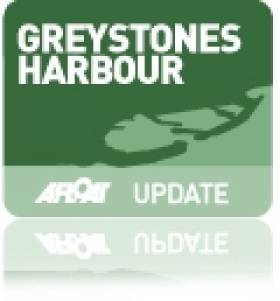Displaying items by tag: Marina
Rosmoney Quay Marina. Yacht & Boat Berths & Storage in Mayo
This important new potoon facility on Clew Bay is located approximately 30 metres from the edge of the permanent pier will allow users of the pier to board and disembark from their boats in a convenient and safe manner.
Mayo Sailing Club, islanders, boatmen and County officials gathered at Rosmoney Pier for the opening for public use of the new floating Pontoon at Rosmoney in April 2013.
Rosmoney near Westport is the base for the Mayo Sailing Club whose members enjoy the excellent sailing grounds that exists among the archipelago of islands in the east of Clew Bay.
Rosmoney is located 8km from Westport town and adjoins Clew Bay. Rosmoney Bay is currently the centre of access to Clew Bay for a wide number of users. Currently there are over 100 marine craft of various descriptions moored in Rosmoney.
The pontoon is made up of a floating pontoon and ramp with safety railings, a water source and power facilities which makes it possible for boats to moor at Rosmoney including local fish farm vessels. Islanders will be allowed to tie their boats to the pontoon while on business on the mainland while other boat users are to use it for loading and uploading.
Valentia Harbour is on the south side of the entrance to Dingle Bay, in a sheltered area between the Valentia Island and the mainland. Knightstown is a fishing port and is the Island's only settlement. It provides visiting yachts with a sheltered anchorage and moorings. There is the outline of a marina (the floating breakwaters) there and they are sometimes used for berthing.
Cranagh Marina. Yacht & Boat Berths in Coleraine
Cranagh marina is located on the Bann Estuary below Coleraine, a four miles sail of the mouth of the Bann, the gateway to the North Coast from inland Ireland. It has an 18–berth jetty that is in the process of being extended to accommodate a further 60 berths.

Cranagh marina on the river Bann. Photo W M Nixon
Rathmullan Marina. Yacht & Boat Berths & Storage on Lough Swilly
Rathmullan marina is a small marina pontoon at Rathmullan, a village in County Donegal is located on the western shore of Lough Swilly and is part of the Fanad Peninsula, situated roughly 12.5 miles from the Lough's entrance and 34 miles northwest of Londonderry/Derry.
The pontoon is suitable for small vessels to berth alongside at a reasonable fee and where fresh water is laid on. There is a concrete slipway suitable for dinghy landing. The Lough Swilly ferry also operates from the pier between Rathmullan and Buncrana, a journey of 45 minutes.
Copelands Marina. Yacht & Boat Berthage at Donaghdee, Co. Down
Copeland Marina is one of Ireland's first marinas. Located on the northeast coast of Ireland two miles south of Copeland Island, that lies outside the entrance to Belfast Lough, and is immediately south of Donaghadee Harbour. It is a compact marina mostly occupied by local boats. It is an ideal destination to enjoy Donaghadee and the Ard's Peninsula with the vessel completely protected in the marina from all conditions.
Manager: Gerald Nicholas.
Copelands Marina Phone: +44 2891 992184 Mobile: +44 7802 36 3382
VHF: Ch 16 ,11, 80
Email - [email protected]
Glenarm Marina. Yachts and Boating Berths in Northern Ireland
Glenarm has long been a port of call for sailors and yachtsmen travelling to and from Scotland's island-studded western coast and has proved a welcoming haven to visitors from all over the world.
Glenarm Harbour offers 40 fully serviced pontoon berths within the village's historical limestone harbour, which is ideally situated within a day's sail of the Western Isles and Clyde. Visiting vessels welcome.
Glenarm Harbour
Glenarm, Co.Antrim, BT44 0EA
Telephone: 028 2884 1285
Greystones Harbour Marina Opens on Easter Monday
#greystonesharbourmarina – The Irish Sea's newest marina opens in Wicklow on Easter Monday. Greystones Harbour Marina will open on 1st April 2013 with 100 berths available initially.
Since arriving on site in December operators BJ Marinas Ltd have been working around the clock to ensure they met their target of being open for the start of the boating season on 1st April.
Managing Director Bernard Gallagher said "We're delighted to be appointed as harbour and marina operators. It's a unique and stunning site and we're looking forward to opening this new marina on Monday'
BJ started taking bookings in late January and have had a steady stream of commitment from berth holders since then.
There will be 100 berths initially ranging from six metres to 30 metres. Once completed there will be 230 berths.
#greystonesharbour – It's full steam ahead at Greystones Harbour where operators BJ Marinas Ltd are putting the final touches to the marina ready for opening in 11 days time on April 1.
Our exclusive photo (taken yesterday) shows recent progress in the marina basin with piling complete and furniture being installed.
BJ, will operate the marina and boatyard, say they are 'really happy with the progress' and confirm the marina will open on schedule.
The pontoon installation will be completed shortly with 100 berths initially and the access bridge should also be complete by the weekend.
Office and facilities will be in place early next week and other services and the access road are also well under way.
Local boaters have already being eyeing up the new facility. Greystones Sailing Club has put together a provisional programme for Keelboat racing this season, a new era for the club.
The County Wicklow marina has received '85 serious enquiries' for berths over the Christmas and New Year Period. Berthing details are here.
The newest addition to boating on Ireland's east coast is operated by BJ Marinas Ltd, a company owned by senior marine industry figure Bernard Gallagher.
The firm are operating the new site under contract from developers Sispar and Wicklow County Council.
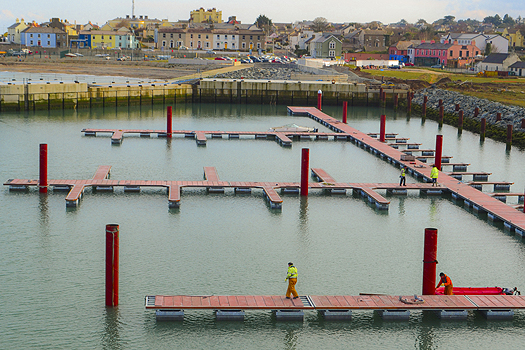
Greystones Harbour Marina takes shape – pontoons are installed this week to give Ireland a new addition to its coastal marina network
Marina Works Start at Wicklow's Greystones Harbour
#greystones – A piling barge to install steel poles for Greystones Harbour marina has arrived on site at the East coast harbour in County Wicklow.
Piling will take most of March to complete and the initial 100-berth marina is planned to open in April. The marina will be operated by BJ Marinas Ltd. Local councillor Derek Mitchell welcomed the arrival of the works that will provide a new destination for Irish sea boaters.
'I'm very pleased that BJ Marinas Ltd are now building the marina which they will operate from April. Its MD, Bernard Gallagher, who was Chairman of the Irish Marine Industry Federation, has provided very useful advice to the project when it was in its formative stages a decade ago' Mitchell told Afloat.ie.
New Greystones Marina Receives Plenty of Interest in Berth Enquiries for 2013 Opening
#greystones – Soon to open Greystones Harbour marina in County Wicklow has received '85 serious enquiries' for berths over the Christmas and New Year Period according to BJ Marinas Ltd, the recently appointed operators of the marina that is due to open on April 1st.
The marina will open initially with 100 berths and work to install the pontoon berths in the new harbour will start with pile driving in two weeks time.
The firm will operate the marina and boatyard on the purpose built site under contract from developers Sispar and Wicklow County Council. Bernard Gallagher of BJ Marinas Ltd is reporting 'a steady stream of enquiries'. Interest is mixed between sail and power craft owners.
The enquiry for the biggest vessel so far being a 55-footer. After piling on February 1st, pontoons are expected to be on site in the third week of February. Access roads are also to be completed at the site.



























